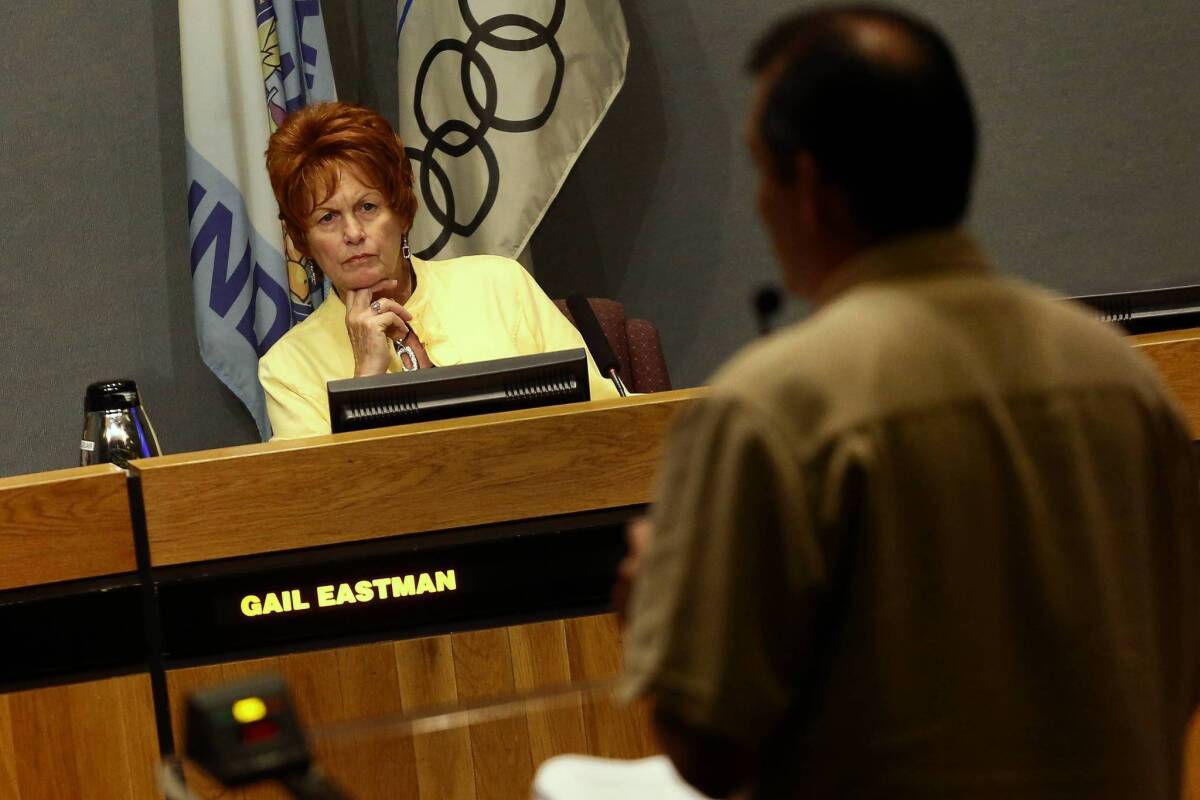Anaheim representation proposal meets criticism from Latino leaders

When a fury of protests erupted on the streets of Anaheim last summer over the officer-involved shootings of two Latino men, demonstrators soon found common cause with a burgeoning call for better political representation for the cityâs growing Latino population.
Tuesday night, after nearly a year of discussion and study, the City Council answered that call by voting to change the way its members are elected. But not, many activists say, in a way that addresses the core of the issue.
Political representation in the city is the subject of a lawsuit filed by the American Civil Liberties Union on behalf of Anaheimâs Latino residents. The suit alleges that the practice of electing council members at-large violates the California Voting Rights Act. Latinos make up nearly 53% of the cityâs population but less than half of eligible voters. Only a few Latinos have ever been elected to the council.
Anaheim is the largest city in California that still elects leaders at-large, rather than by district.
The measure approved Tuesday maintains at-large voting but imposes a requirement that council candidates live in specified districts.
Proponents say it will ensure the cityâs diverse population is well-represented. But many who called for change in the first place said the measure falls short of moving toward fair representation for Latinos in city government. They argue that only voting districts, in which each district elects its own council member, would provide adequate representation.
The council also decided to ask voters to permanently ratify the change and to decide whether to expand the number of council members from four to six, with the mayor elected at-large. A measure that would have asked voters to approve voting districts was defeated 2 to 3.
Mayor Tom Tait, who has advocated for voting districts, said the at-large proposal âconfuses the issue.â
âIâm very disappointed to see this will be on the ballot,â he said.
The debate over political representation preceded the officer-involved shootings that stirred angry protests in the city. But as discontent swelled, the two issues became conflated and prompted activists and others to fight for voting districts.
In August, Tait proposed a ballot initiative to create those districts, but the council opted to appoint a 10-member panel to study possible election changes.
Since then, council meetings have grown tense, loud and occasionally viciously personal.
Many of those rallying for voting districts see the council as out of touch, separated from the plight of the cityâs poorer residents and more interested in protecting business interests. Critics say districts would divide the city into fiefdoms, each looking to preserve its own self-interests.
The 10-member panel recently recommended that the question of districts be put to voters. The council rejected that proposal and opted to consider an alternative measure that would maintain at-large voting but impose a residency requirement. Councilwoman Gail Eastman later revived the voting districts measure.
Vivian Pham, who chaired the panel, said she was frustrated by the councilâs actions.
âAgain, theyâre not listening to the people,â she said.
Councilwoman Kris Murray, who proposed the alternate at-large measure, said voting districts would divide the city.
Murray lives in affluent Anaheim Hills, but she said she takes being an at-large representative seriously and focuses much of her attention beyond her own neighborhood. She noted work she has done in the Ponderosa area of Anaheim, in particular. During budget talks, she advocated an infusion of funds to improve and build parks and community spaces in other areas, and has worked with a computer company to build a computer lab for community use.
âI donât believe we are six or eight Anaheims; I believe we are one city,â she said. âI donât represent Anaheim Hills. I represent the city of Anaheim.â
Some who protested and advocated over the last year for voting districts said they are frustrated by the councilâs unwillingness to ask residents to vote on the matter. Just hours before Tuesdayâs meeting, Orange County Communities Organized for Responsible Development, which supports voting districts, released a YouTube video titled âWhy We Wonât Be Attending the Anaheim City Council Meeting.â
âBefore we used to rally, we used to speak to the City Council,â said Arturo Ferreras, who lives near Downtown Disney.
But, he said, âTheyâre not listening. Theyâre really not listening.â
Instead of attending council meetings, he said, he would spend his time organizing people in his neighborhood in preparation for future elections.
More to Read
Sign up for Essential California
The most important California stories and recommendations in your inbox every morning.
You may occasionally receive promotional content from the Los Angeles Times.











